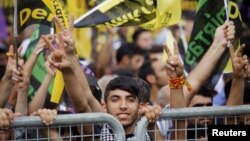Turkey's pro-Kurdish HDP has announced it will run as a political party instead of fielding candidates as independents in June's general election. But if the party fails to secure the required 10 percent of the vote, it could open the door to the ruling AK party to achieve its goal of securing enough parliamentary seats to change the constitution and introduce a presidential system.
Turkey’s election threshold of 10 percent, introduced after the military seized power in 1980, was to ensure politically stability after years of weak coalition governments.
But observers say the main reason was to ensure Turkey’s large Kurdish minority would never enter parliament. To circumvent the restriction, pro-Kurdish party members have stood as independent candidates.
But the leader of the pro-Kurdish People’s Democracy Party, HDP, Selahattin Demirtas, has announced that in the June general election candidates will run as a party.
Expert on Kurdish affairs and columnist for Turkey’s Milliyet newspaper Kadri Gursel says the move is a challenge to the Turkish political system.
"This record high threshold has been introduced by the Putschists generals. Now it’s being historically challenged by imposing a dilemma to the Turkish political system of choosing between the stability and instability out of the parliament,” Gursel said.
Big gamble
HDP leader Demirtas secured nearly 10 percent of the vote in last August's presidential elections by reaching out to Turkish voters on a platform of democracy and pluralism.
But the move to run as a party is proving more difficult.
All but one opinion poll put the pro-Kurdish party below the 10 percent threshold. And, if the party fails to enter parliament, all its votes and its current deputies will transfer to its closest rival, the ruling AKP.
Political scientist Cengiz Aktar of Istanbul’s Suleyman Sah University warns that such a scenario could have far-reaching consequences.
"It's very risky because if they don't make it to the parliament, that would imply AKP would reach the necessary number of MPs of 330 to go for a referendum in order to change the constitution and make Turkey a strong presidential system like Russia. And it will very quickly drifts towards a totalitarian system," Aktar said.
Possible win-win for Kurds
Members of Turkey’s main opposition parties have criticized the pro-Kurdish party for its decision.
Political scientist Aktar says there is growing suspicion over the motives behind the move.
"The nationalists in Turkey are viewing this as a secret deal between the Kurdish political movement and the AKP. They would indirectly offer the presidential system and in turn they may get large autonomy or in turn they may get even secession," Aktar said. "This is what the Turkish nationalists think, and the party has not been capable of defusing this sort of suspicion."
Until now the pro-Kurdish HDP leader Demirtas has dismissed the accusations. But adding to those suspicions is that the government is currently engaged in peace talks with Abdullah Ocalan, the imprisoned leader of Kurdish rebel group the PKK.
But columnist Gursel says the move to run as a party is based on sound political strategy.
"Kurds have a win-win perspective. They will win if they pass the threshold, they will be represented with a strong parliamentary group [of] over 70 seats. If they lose, if they won’t be representative in parliament, at the end of day they will be worldwide recognition for the secession of the Kurds from Turkey and they will create a social mobilization among Kurds," said Gursel.
Speculation is already rife in the Turkish media that an HDP left out of parliament will overshadow the elections' legitimacy and push Kurds into going their own way, just as Syrian Kurds did with their autonomous regions, plunging Turkey into political chaos.




